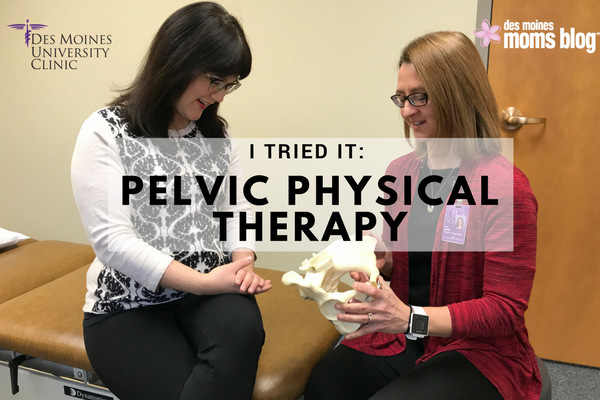Let’s just put this out there: I don’t want to buy my underwear in the same aisle where I pick up my kids’ pullups. But since becoming a mother, I’ve quoted the line from Billy Madison “If peeing in your pants is cool, consider me Miles Davis!” one too many times.
So, I met up with Dr. Kari Smith, a Des Moines University Clinic physical therapist who specializes in restoring pelvic health, to guide me through the process she uses with patients who are experiencing anything from the embarrassing pee-when-you-sneeze syndrome to pain during intercourse or other activities ‘down under.’
“I want women to know that these problems are common, but they’re not normal,” Dr. Smith says. “And physical therapy can help to restore your function by regaining the coordination to contract and relax the pelvic floor correctly.”
The initial consultation for pelvic physical therapy starts with a discussion of your responses from a mailed questionnaire and normal bladder habits. (If you’re a mom who is getting by on a combo of Diet Coke, coffee and wine, know that caffeine and carbonated beverages can irritate the bladder lining and exacerbate issues.)
Then you’ll get to learn a little bit about the muscle anatomy in your pelvic floor. The physical therapist will show you a model of a female pelvic area, pointing out which muscles create a kind of sling that holds in your organs, and which provide hip stability and support – and that can also contribute to pelvic pain.
After some “lady anatomy 101” comes a posture check. You’ll show how you stand and sit and do a few functional movement demonstrations. If you’re having pain when you’re picking your baby up out of the crib, for example, she’ll want to see how you’re doing that so she can suggest alternate postures and strengthening exercises targeted to the exact areas where you’re weak. (Apparently, my right hip is weaker than my left, so I got to work on side-stepping with a resistance band around my knees!)
A portion of the visit involves a kind of pelvic exam, where the doctor of physical therapy will be looking at, touching and feeling how your pelvic muscles contract and relax. She’ll be watching your breathing pattern, abdominal stability and checking for any scarring. This is all done to develop a specialized program tailored at your specific needs and weak areas.
Dr. Smith uses a trauma-informed approach when she sees her patients, and is incredibly sensitive to the fact that some patients who have birth injuries or have experienced abuse might need some coaching in how to relax their muscles (kegels aren’t right for everyone). She can also target strengthening on specific sides, and offer immediate feedback so patients can properly exercise at home. Dr. Smith is basically a personal trainer for your vagina. She’s done nationally-recognized research on pregnancy, pelvic pain, and mobility, too.
Each pelvic physical therapy visit takes around 45 minutes to an hour, and the physical therapists can work around having kids present if necessary. Typically, patients can restore functions after as few as four to six visits, which should be covered by insurance with a basic co-pay. No doctor referral is necessary.

“It’s empowering to take your life back,” Dr. Smith says. She knows many women who experience incontinence and pelvic pain suffer in silence, and she wants to break the stigma so women feel as comfortable reaching out for help with their pelvic muscles as they would after injuring a shoulder or knee.
Learn more about how the physical therapists at Des Moines University Clinic can help by visiting https://www.dmu.edu/clinic/physical-therapy/ or call (515) 271-1717 to make an appointment.


















I love that you are bringing attention to this service that many women don’t know even exist!
Thank you, Kelsey! It can be a taboo topic but it’s totally common and I’ve been blown away by the professionalism of our DPT faculty clinicians.
I already heard from a friend who scheduled an appointment and saw relief!